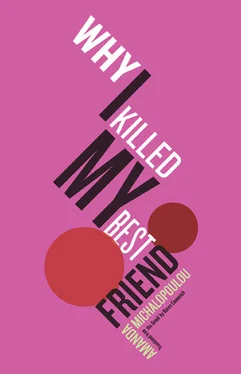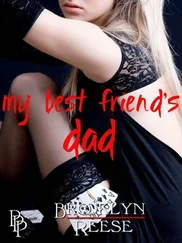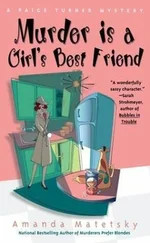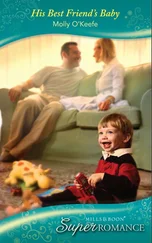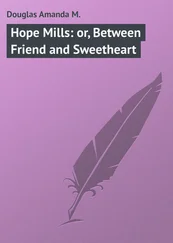Shortly before the end of the school year, Aunt Amalia buys me a game called Little Wizard, a box full of magic tricks. You learn how to make colorful bits of paper disappear or do card tricks or hide plastic animals in a hat with a false bottom. Anna and I climb onto the magic carpet and do magic tricks for an imaginary audience of poor kids. Everything always has to be about the poor. That’s why Anna gets mad when Aunt Amalia takes us to see My Fair Lady , a movie about Eliza Doolittle, who starts out as a beggar but by the end is a real princess, after an aristocrat takes her in off the street and teaches her how to speak properly. Eliza’s name in real life is Audrey Hepburn. She has a very long neck and wears her hair in a bun. Aunt Amalia gets tears in her eyes, probably because she’s thinking how if things had turned out differently, she too could have lived like a princess. I want to tell her that the princess Constantine married was a fool, but Aunt Amalia says, “Shhh, don’t talk in the movie theater.” My favorite scene is when Eliza Doolittle can’t sleep because she’s in love with the aristocrat. The maid puts her to bed but she keeps popping back up to her feet like a spring. Anna grunts in disgust and says that Eliza was happier back when she was selling flowers in the street and hadn’t gotten so hoity-toity. “But she’s not!” I cry. “Of course she is,” Anna says, “just like you.”
“Where is your family going to spend the summer?” Aunt Amalia asks Anna on the way home.
“ A Paris ”
“I’m going to Ikeja, right?”
“No, honey. You’re coming to Aegina with me.”
Merde, merde.
Martha and I are sitting on the low wall in the garden, playing beauty pageant. Martha and Fotini are sisters, and they’re my summer friends on Aegina. Only today Fotini is grounded: she stole a teacup from Martha’s tea set, hid it in the yard, and won’t say where. Her punishment is that she has to stay in her room until it’s time for the live broadcast of the Thessaloniki Song Festival. The girls have an older brother, Angelos, who is in high school, but he doesn’t talk to us. Each summer Aunt Amalia rents a room on the ground floor of the girls’ house, where their grandfather used to live before he died. She and I sleep together in the double bed. We leave the windows open and the bougainvilleas outside shape the shadows of junta fascists, or the grandfather’s ghost. One night I got scared and woke up Aunt Amalia, who sleeps with curlers in her hair. “Oh, Maria, there’s no reason to be scared, with these curlers I’d frighten even a ghost away!”
In the mornings we have breakfast together. The girls’ mother, Kyria Pavlina, has a goat and makes her own yogurt. The only bad part is that we eat it at their kitchen table, under a strip of fly paper covered with dead flies. Kyria Pavlina doesn’t like to kill flies with a fly swatter. She prefers for them to get stuck on the paper and die on their own.
After breakfast we go down to the beach to swim or to dig deep holes in the sand. Fotini and Martha are always singing a song by the child star Manos: You don’t live in my time, Mom, you don’t live in my time, Dad. . I like it a lot but I also know it would annoy Anna. In fact we do all kinds of things that Anna wouldn’t like. We watch Little House on the Prairie and wear cherry lip gloss during our beauty contests. There are three titles, one for each of us: Miss Beauty, Miss Inner Beauty, and Miss Youth. Fotini always ends up being Miss Youth because she’s the youngest. Martha likes being Miss Beauty, and I’m happy with Miss Inner Beauty, so it works out just fine for us all.
“Girls, the festival is starting!” Kyria Pavlina calls. Martha and I abandon our beauty pageant in the middle and run to the television. Fotini comes, too, since her punishment is over. We’re rooting for a girl, Roula, who sings in the commercial for Roli cleaning powder. Please tell me, Dad, is love good or bad? Today he gave me my first kiss, and I cried with bliss. . Her father gives his approval and Roula gets as excited as Eliza Doolittle: Well, then, I’ll say it, I love a boy, I love him and I want him tons!
This summer I’m in love with Angelos. He’s very serious and wants to be a nuclear physicist. We only see him in the morning when he wakes up and at night before he goes to bed. The whole rest of the day he’s out roaming around with his friends. I’ve lost all interest in tanks and submarines. No more lies. Mom has gone to help Dad empty out the house in Ikeja. She left me behind, with Aunt Amalia.
Next fall Gwendolyn will be telling her proverbs to other kids.
I keep whistling the tune to “Please Tell Me, Dad,” but Anna covers her ears when she hears it. Of course I don’t tell her about the beauty pageants.
“Aegina ruined you,” she says, raising an eyebrow, the one with the white streak.
“Why?”
“It made you dumb.”
I look down at my shoes. She’s right, after all.
“But maybe it’s not your fault, it’s those girls, what were their names again? Fotini and Martha.”
Anna lectures me about how the Socialist Party in Sweden lost power after forty-four years and how the Workers’ Party in Great Britain is weaker than ever before, as if I were to blame. She tells me that in Paris she made some important decisions, when she grows up she wants to be like Gisèle Halimi, Sartre, and de Beauvoir’s lawyer who risked imprisonment for supporting the Algerian National Liberation Front. I understand barely half of what she says, but I keep nodding my head. She’s determined to bring me back to the proper path, and tells me about Patty Hearst, who disowned her rich father and started robbing banks, and sixteen-year-old Nadia Comăneci, the human rubber band from the Montreal Olympics. We braid our hair to look like Comăneci, put on our gym clothes, roll aside the portable table in the living room and practice our splits. Next is modern dance. Anna always chooses the theme. Our choreographies have names like “Long Live the Revolution” or “The Students” or “A Carnation on the Polytechnic Memorial.” The dances are full of pas de chat and when we start to sweat, we lie down on the rug and stare at the ceiling.
“A perfect score!” Anna tells me. “You’re not dumb anymore.” I hug her and we roll like barrels into the hall, splitting our sides with laughter. That’s where Antigone finds us when she opens the front door.
“You crazy girls, on va manger quelque chose ?”
We eat backwards this year, too, main course first, then salad. Antigone shows me pictures from their summer in France. The whole family went to Deauville, to the house of some friends. Anna’s father has a blondish beard. In all of the photographs he’s smoking a pipe and reading a newspaper. Anna is sitting in his lap, arms wrapped around his neck.
“Do you love your dad a lot?”
“What do you mean, don’t you love yours?”
“Sure, I love him, only I’ve forgotten what he’s like.”
And yet that very same night, Mom and Dad come home from the airport. I cling to my father’s neck, just like Anna, and burst into tears.
“Why are you crying, little grasshopper?” Dad says.
“Don’t call her that, please!” Mom says, and she starts crying, too.
I’m afraid that now that he’s come back to Athens Dad might start calling me Maria Papamavrou and saying that I’m a naughty girl, the way Mom does. I’m afraid that now that we live in Athens I might actually be turning into a naughty girl, not to mention a dumb one. That I might have left all my goodness and smarts in Africa.
This fall we have a man for a teacher, Kyrios Stavros. He’s short and wears silk vests that barely contain his big belly. The fifth-grade reader is called The High Mountains and Kyrios Stavros says we’re going to like it a lot because it’s full of adventures. My biggest adventure, though, is the week when Anna stays home because she has the mumps. Angeliki keeps saying “teapot” over and over until it sounds like “potty,” and Petros picks his nose, chases me down, and wipes his snot on my legs.
Читать дальше
